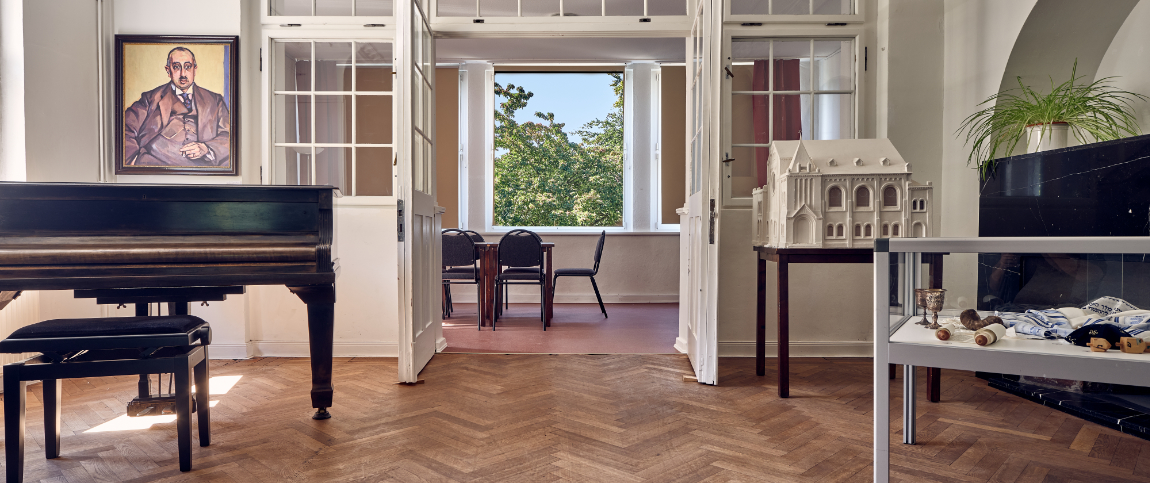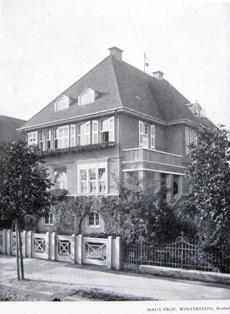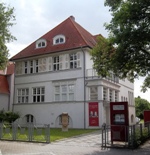THE ROSTOCK JEWISH HERITAGE CENTRE – קרן מקס־זמואל־האוס
Max-Samuel-Haus is the colloquial naming for the foundation housed in the homonymous villa, officially operating under the somewhat baroque appellation «Stiftung Begegnungsstätte für jüdische Geschichte und Kultur in Rostock» (literally: Foundation of the Meeting Place for Jewish History and Culture in Rostock).
The Max-Samuel-Haus is as the Rostock Jewish Heritage Centre a meeting place, cultural venue and research institute, run by the foundation. The Haus is located in Rostock, a city by the Baltic Sea and the biggest city in Mecklenburg, which together with the German part of Hither Pomerania forms part of today's state of Mecklenburg-Vorpommern in Germany.
THEMATIC FOCAL POINTS OF THE HAUS
The most important task of the foundation is the education about Jewish culture and historic Jews in order to effectively counteract anti-Semitism and intolerance. An additional focal point is work for children and adolescents, but also any other interested party of any age. In the house there is a publicly accessible library xxxlink focused on Jewish culture and history available for anyone interested.
14 publications on various topics have hitherto been published by the Haus. We organise readings, concerts, presentations, and also thematic exhibitions (for example, about nearly forgotten or little known Jews, other individuals, events, or institutions from Mecklenburg-Vorpommern). The Haus develops and shows own exhibitions always referring to local or regional content of Jewish interest and occasionally also presents exhibitions of related content curated by others.
However, the strongest impression is left by the «Stumbling Blocks» (or Commemorative Stones [Stolper- or Denksteine]) which lie in the sidewalk in front of former homes of Shoah victims. These are donated privately and by businesses. Further activities of the house can be found on the Events page.
The work of the Max-Samuel-Haus is accompanied by two volunteer committees – a board of directors (Vorstand) and a board of trustees (Kuratorium). The «Verein der Freunde und Förderer des Max-Samuel-Hauses e.V.» (Association of the Friends and Sponsors of the Max-Samuel-Haus e.V., a booster club) is also involved.
THE NAMESAKE OF THE HOUSE
Max Samuel (born 9 January 1883 in Argenau, Kuyavia, Prussian Province of Posen, died 2 September 1942 in Blackburn, Lancashire, England) was a businessman and self-made man, founder and from 1906 to 1938 managing-director of the «EMSA-Werke», from 1923 to 1938 chair of the Jewish congregation in Rostock (Israelitische Gemeinde Rostock), established in 1870, and from 1930 to 1938 the head deputy of the «Israelite Upper Council» (Israelitischer Oberrat), the executive of the «Board of Deputies of Mecklenburg-[Schwerin] Jews» (Israelitische Landesgemeinde Mecklenburg[-Schwerin]), established in 1763.
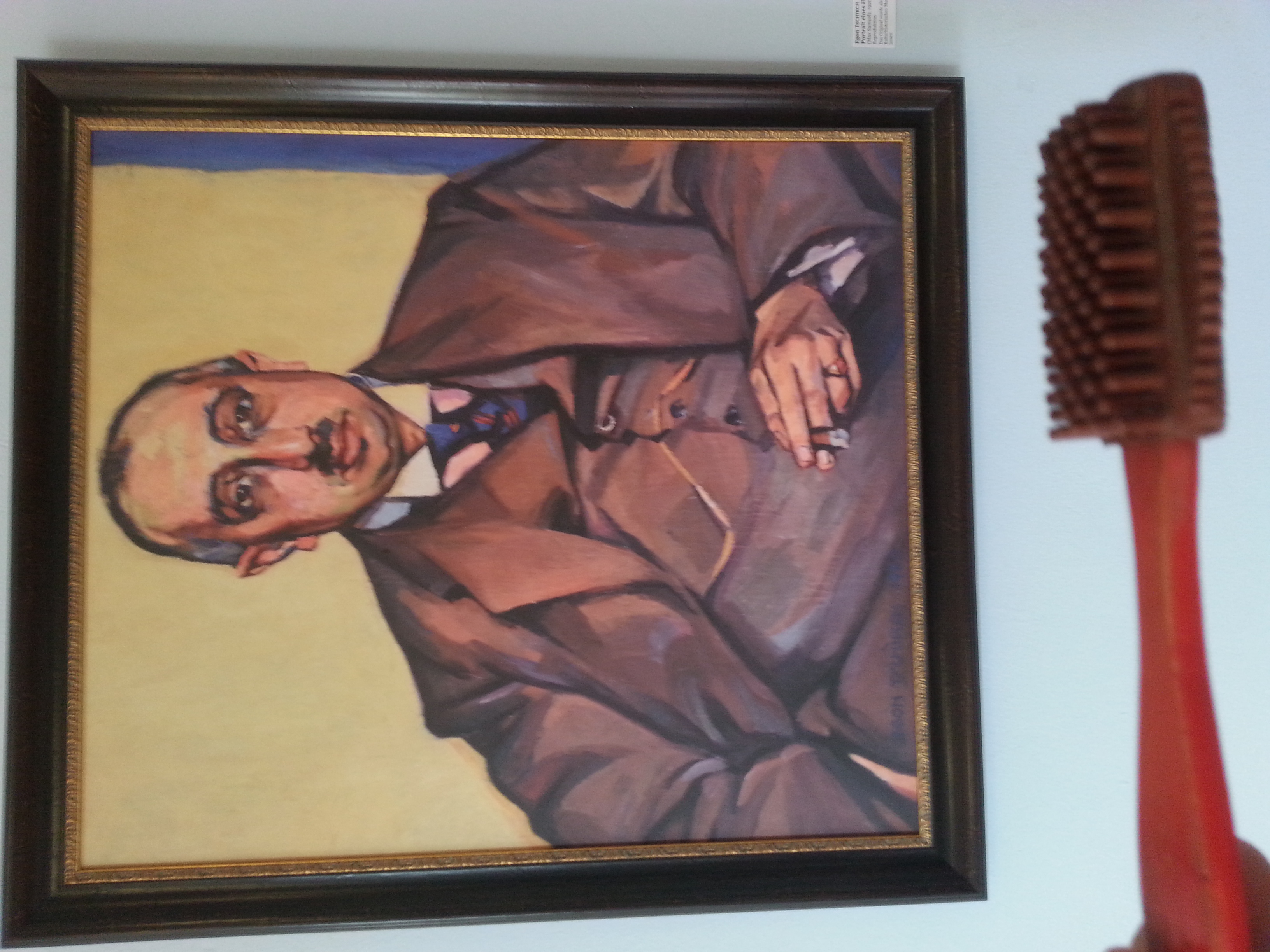
Reproduction of Egon Tschirch's (1889–1948) 1920 portrait of Max Samuel with the latter's invented suede brush, photo 2017.
At the age of 14 he moved from the Kingdom of Prussia to the Grand Duchy of Mecklenburg-Schwerin to begin his education in the shoe business of his eldest brother James Samuel (1871–1933) in Güstrow. There he experienced an early opportunity to develop an invention. Among other things, he invented a brush for maintaining suede shoes. Thanks to the development of shoe accessories, orthopedic items and articles of foot and shoe care he could found a company in Güstrow in 1906, the EMSA-Werke. In this year he also got married to Berta Geßner (1878–1937), a daughter of the Bavarian teacher and chazzan Jakob Geßner (1848–1937). Max’s son Herbert Samuel (1907–1992) and daughter Käte Samuel (1910–1987) were born in Güstrow.
Villa on Schillerplatz 10, by 1913
The conditions in Güstrow were not opportune for his expanding business. He therefore purchased premises along Rostock’s Friedrichstraße and had his factory moved there, where at times 150 employees were employed. In 1921 he acquired the villa at Schillerplatz 10 as his home. The villa, completed in 1912, was designed by the architect Paul Korff (1875–1945) for the professor of physiology Hans Winterstein (1879–1963), who sold it once having accepted a chair at the Silesian Frederick William's University in Breslau. In 1923 he became chairman of Rostock’s Jewish congregation, which was the largest in the then two Mecklenburgs.
In the «Israelite Regional Assembly» (Israelitische Landesversammlung, i.e. assembly of deputies of Mecklenburg-Schwerin's Jews) he successfully argued for the transferral of the chief rabbinate (Landesrabbinat) and «Israelite Upper Council» (Israelitischer Oberrat) the executive of the «Board of Deputies of Mecklenburg[-Schwerin] Jews» (Israelitische Landesgemeinde Mecklenburg-Schwerin, established in 1763 and from mid-1934 on, after including its counterpart from Mecklenburg-Strelitz, without the affix «Schwerin») from Schwerin, the capital of Mecklenburg-Schwerin, to Rostock, the biggest city with the most populous Jewish congregation.
Before the end of the monarchies of Mecklenburg-Schwerin and Mecklenburg-Strelitz in 1918, then German states without elected parliaments on the state level, Max Samuel was politicallly active in the liberal electoral association, while political parties on Mecklenburg state level were still forbidden, supporting liberal Reichstag candidates to implement state-level reforms from the imperial level.
Right after the revolution he joined and supported the new «German Democratic Party» (DDP), founded in 1918. In 1930 Max Samuel was elected a member of Mecklenburg-Schwerin's five-person state executive committee of the «German State Party» (DStP) which was the DDP's successor. He was societally engaged via membership in the State University Society (Landes-Universitäts-Gesellschaft) and the Fraternity of Businessmen (Korporation der Kaufmannschaft).
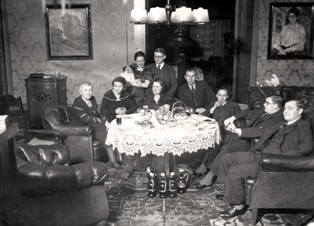
Family and guests at Max Samuel's 50th birthday, 1933xxxnamen der abgebildetenxxx
After the Nazis came to power in 1933, Max Samuel could no longer perform either function. He limited his activity to his business and the management of the Jewish religious bodies. Then he was concerned with the protection of Jewish graveyards in the then two Mecklenburgs, and he tried to strengthen the mental self-assertion of Jews. He especially minded the ever-more-important social activity of the Jewish congregation. Many workers who had been fired due to their religion came to work in his factory, and he provided emigration papers or cash.
In 1934 his son emigrated to London (Great Britain) to found a branch of the EMSA-Werke. Berta Samuel died in 1937. Max followed his son in late 1937, with their daughter and granddaughter Ruth Kaiser (b. 1935) leaving Germany in September 1938. In December 1938 the EMSA-Werke were seized.
THE BUILDING BETWEEN 1939 AND 1991
Between May 1939 and July 1945 the house was used as a laboratory by the «Kaiser-Wilhelm-Institut für Tierzuchtforschung» (institute for research in animal breeding, a branch of the «Kaiser-Wilhelm-Gesellschaft», the predecessor of today's «Max-Planck-Gesellschaft»). After the war the Rostock branch of the East German Cultural Association (Kulturbund) was founded in the house. After that the city’s education authority (Schulbehörde) relocated there and remained until 1955. From 1955 to 1991 the house was used as a kindergarten.
HISTORY OF THE MAX-SAMUEL-HAUS FOUNDATION
Although not welcome by the communist government at the time, Frank Schröder (1958–2014), then a city archivist of Rostock, started to research the history of Rostock's Jews, and later built up contacts with other enthusiasts meeting in the «Work study group Church and Judaism» (Arbeitsgemeinschaft Kirche und Judentum) with Christiane Niemann under the umbrella of the «Evangelical Lutheran Regional Church of Mecklenburg».
Through group members who had never abandoned their contacts to their Jewish friends who had fled Germany the circle started to interview them to complement, enrich and clarify the archival findings and local personal records. In an attempt to improve East German relations to the USA in the mid-1980s, East German communists began to allow interested parties, previously silenced, to account for Nazi anti-Semitism and its victims, since East Bloc powers saw Jews as the influencers to open the doors of the «White House» to the East German leader.
The communist regime suddenly permitted first publications and public lectures on Jews and their fate, of course skipping the anti-Semitic policies by the «Soviet Military Administration in Germany» and communist East Germany after 1945. The communists allowed the Church of Mecklenburg to invite the Ex-Rostocker Yaʿaqov Zur (né Alfred Jacques Zuckermann; 1924–2013), then living in Israel, to lecture in Rostock, whereas anti-Zionist East Bloc powers else blocked any exchange with Israel. In fact, the Rostock enthusiasts were one of a handful of initiatives who could transform their yearslong private studies into one of a few East German publications on that subject.
Copies of East German newspaper articles on Jewish Rostockers and the book by Ingrid Ehlers and Frank Schröder (Zwischen Emanzipation und Vernichtung: Zur Geschichte der Juden in Rostock, Rostock: Stadtarchiv, 1988) were shared among former Rostockers living west of the Iron Curtain, with Herbert Samuel receiving them through more than one mailing chain.
With the end of East Germany's dictatorship in November 1989, communist neglect of Jews and the notorious ant-Zionism of the East Bloc could be unveiled and criticised. Ideas to present their research results in one of the homes formerly owned by a Rostock Jewish family appeared first by the end of 1989. The gained liberties empowered Schröder and his fellow activists in January 1990 to call for officially founding an association for the research and presentation of Jewish history and culture in Rostock (Vereinigung für jüdische Geschichte und Kultur in Rostock e.V.), registered in June 1990, not long before the Germanies united on 3 October that year.
Herbert Samuel and Schröder entered into direct personal correspondence after February 1991 and developed the idea of the Schillerplatz 10 villa becoming a home for this association. In mid-July of 1991, the association was able to move into a first rented room in the villa's attic flat. On 22 August 1991 Herbert Samuel donated the villa to the Foundation, newly to be founded, and, colloquially referred to as the «Max-Samuel-Haus», as the villa was named after its donation after the father of the donor.
Herbert Samuel decided to donate the villa in an effort towards reconciliation between Jewish Germans and their descendants and non-Jewish Germans, as he explained. In October 1991 Herbert Samuel informed the staff of the Max-Samuel-Haus that his brother-in-law Herman Geo. Kaiser (1904–1992) fully supported Herbert's idea to donate the villa to the foundation.
Max Samuel House, 2012
On 2 September 1991, the 49th anniversary of Max Samuel's death, the foundation's board held its opening session. The daycare moved out and on 2 October 1991 the villa, named Max-Samuel-Haus since, was dedicated to its new purpose as the Rostock Jewish Heritage Centre, a meeting place, cultural venue and research institute, run by the foundation.



